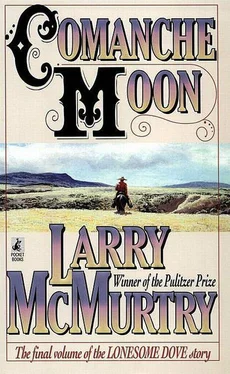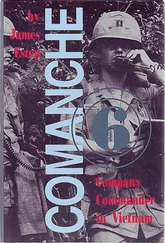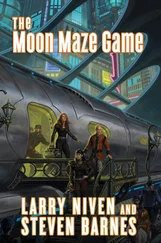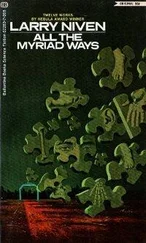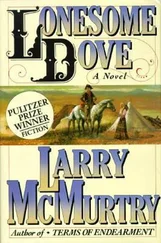"The Parker girl was taken twenty-five years ago," Call reminded Goodnight.
"Comanche women themselves mostly don't live that long. I doubt any white woman could survive it." "I know I couldn't survive twenty-five years in one of their camps," Augustus said.
"If I couldn't get to a saloon now and then I'd pine away." He said it in jest, hoping to lighten the general mood, but the jest failed. The mood was grim and stayed grim. They had killed six Comanche women as they charged into the camp; they had also killed three Kickapoo captives who were only boys. It was not their practice to kill women or the young, but the men were frightened, the dust was bad, and they knew there was a band of Comanche hunters in camp or not far away. At such times fear and blood lust easily combined--it was impossible to control nervous, frightened men in such a situation; men, in particular, who had good reason to hate all Comanches. Except for the new soldiers there was scarcely a man in the troop who had not lost loved ones in the Comanche raids.
Killing women left a bad taste in the mouth.
But the deed was done: they had killed six. The women were dead. There was nothing to do but go home.
They were all troubled by the woman's screaming, and by the way she ripped at her breast when she saw that they meant to take her. Despite her blue eyes and white skin, the poor woman thought she was Comanche; she wanted to stay with the people she felt and believed to be her own. Taking captive women back was not a duty any of the men could be sure of or be easy with. Of course, leaving a white woman with the Comanches would have been just as hard and left them just as uneasy.
"She doesn't know English," Goodnight said. "She's been with them so long she's forgot it." "In that case it would be a mercy to shoot her," Call said. "She'll never be right in the head." "I don't know why you think she's the Parker girl, Charlie," Augustus said. "That girl was taken before I was even a ranger, and I can't even remember what I was before I started being a ranger." "You were a loafer," Call said, though he agreed with Gus's point. Sometimes Goodnight's opinions irritated him. The poor woman could be anybody, yet Goodnight had convinced himself that she was the long-lost Parker girl, the mother, some said, of Quanah, the young war chief of the Antelope band, a warrior few white men had ever seen.
"I know the Parkers, that's why I think it," Goodnight said. "I've been around Parkers ever since I came to Texas, and this woman looks like Parker to me." "Even if she was born a Parker, she's a Comanche now--and she's got a Comanche child," Augustus said. "Call's right--it would be a mercy to shoot her." Goodnight didn't argue further. He saw no point; there was no clear right to be argued. The captive was a white-skinned woman with blue eyes; she had not been born a Comanche. They could neither shoot her nor leave her. He knew, as did Call and McCrae, that only sorrow awaited her in the settlements of the whites. It was a hard thing. The white families, of course, thought they wanted their captive loved ones back --they thought it right up until the moment when rangers or soldiers did actually return some poor, ragged, dirty, wild captive to them, a person who, likely as not, had not been washed, except by the rains, since the moment they had been stolen. If the captivity had lasted more than a month or two, the person the families got back was never the person they had lost. The change was too violent, the gap opened between new life and old too wide to be closed.
Call said no more about the white woman, either.
He knew they were saving her merely to kill her by tortures different from those the Indians practiced. He could take no pride in recovering captives, unless, by a rapid chase, the rangers were able to recover them within a few days of their capture; only those who had been freshly taken ever flourished once they were returned.
As usual he rode homeward off the plains with a sense of incompletion. They had fought three violent skirmishes and acquitted themselves well.
Some livestock had been recovered, though most of the stolen horses had escaped them. Several Comanche warriors had been killed, with the loss of only one ranger, Lee Hitch, who had lagged behind to pick persimmons and had strayed right into a Comanche hunting party. They shot him full of arrows, scalped him, mutilated him, and left; by the time his friend Stove Jones went back and found him the Comanches had cut the track of the ranger troop and fled to the open plains, joining the horse thieves in their flight. Stove Jones was incoherent with grief--in the space of an hour he had lost his oldest friend.
"Them persimmons weren't even ripe yet, either," Stove said--he was to repeat the same bewildered comment for years, whenever the name of Lee Hitch came up. That his friend had got himself butchered over green persimmons was a fact that never ceased to haunt him.
Call regretted the loss too. An able ranger had made a single mistake in a place where a single mistake was all it took to finish a man. It was the kind of thing that could have happened to Augustus, if whiskey bottles grew on bushes, like persimmons.
What troubled him continually was the impossibility of protecting hundreds of miles of frontier with just a small troop of men. The government had been right to build a line of forts, but now the civil war was rapidly draining those forts of soldiers. The frontier was almost as unprotected as it had been in the forties, when he and Augustus had first taken up the gun.
The Comanches had been in retreat, demoralized, sick, hungry--a few aggressive campaigns would have eliminated them as a threat to white settlement; but now, because of the war, progress had been checked. With so few fighting men to oppose them, the Comanches would raid again at will, picking and choosing from the little exposed ranches and farms. There had just been reports that a young chief had even ridden down the old war trail into Mexico, destroying three villages and costing the Mexicans many children.
It left Call with such a sense of futility that he and Augustus had even begun to talk of doing something else. They rarely had even fifty men under their command at any one time.
Though the Comanches were comparatively weak, the rangers were weaker still.
Meanwhile, to the south and west, the banditry raged unchecked. The more prominent cattlemen of south Texas--men such as Captain King--were virtually at war with their counterparts in Mexico, forced to employ large bands of well-mounted and well-armed riflemen in order to hold their ground.
To the east, where the war raged, the tide of battle was uncertain; no one could say whether North or South would win. Even those partisans in Austin who regarded General Lee as second only to the Almighty had muted their bragging now.
The struggle was too desperate--no one knew what would happen.
What Call did know was that his own men were tired. They had more ground to cover than any one group of men could reasonably be expected to cover, and, despite many promises, their mounts were still inadequate. Governors and legislators wanted the hostiles held in check and the bandits hung, but they wanted it all to be done with the fewest possible men on the cheapest possible horses. It irritated Call and infuriated Augustus.
"If I could I'd strike a deal with old Buffalo Hump," Augustus said at one point --admittedly he was well in his cups--?I'd bring him down and turn him loose in the legislature. If he scalped about half the damn senators I have no doubt they'd vote to let us buy some good horses." "How could they vote if they were dead?" Call asked.
"Oh, there'd soon be more legislators," Gus said. "I'd make the new ones dig the graves for the old ones. It would be a lesson to them." Meanwhile, the captive woman had not ceased or abated her shrieking. It was a cold, cloudy day, with a bitter wind. The woman's wild shrieking unnerved the men, the younger ones particularly. As Pea Eye watched, the woman tried to bite her own flesh, in order to pull her wrists free of their rawhide bonds. She bit herself so violently that blood was soon streaming down her horse's shoulders. Of course it did no good. Jake Spoon had tied the knots, and Jake was good with knots. It was Jake, of all the rangers, who seemed most disturbed by the woman's screaming.
Читать дальше
